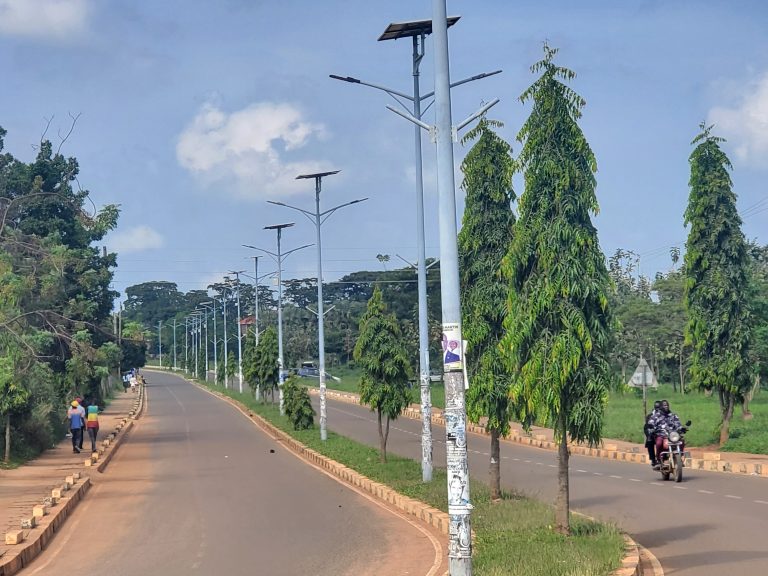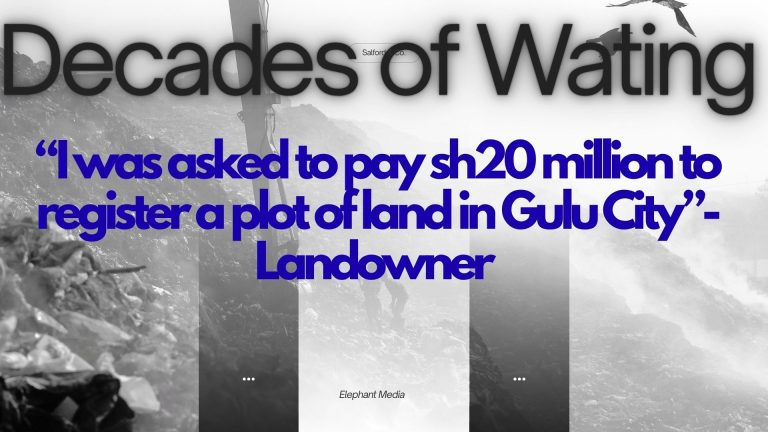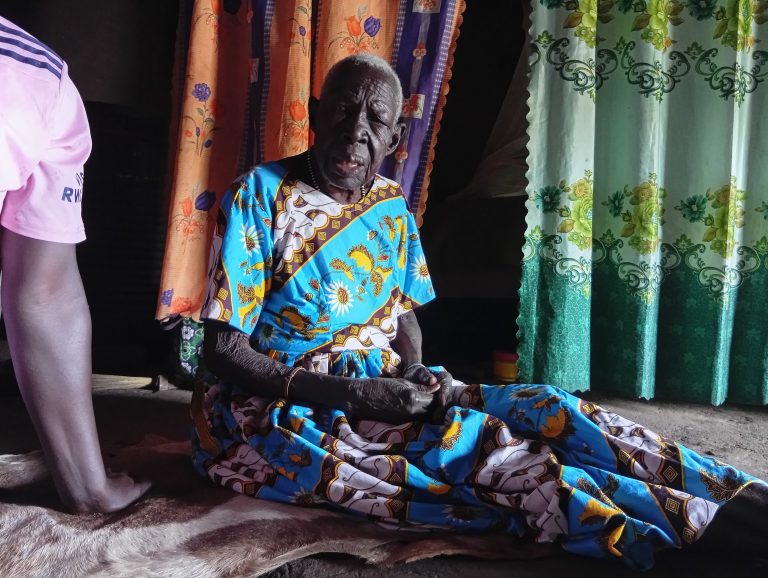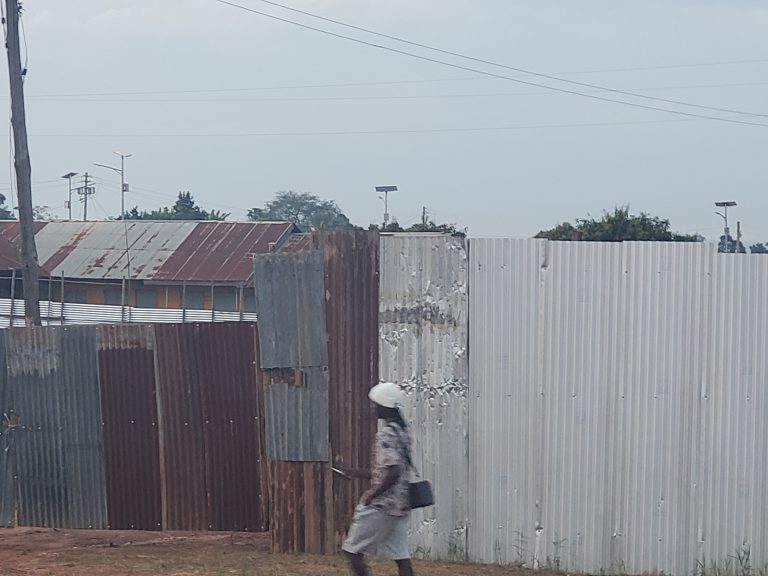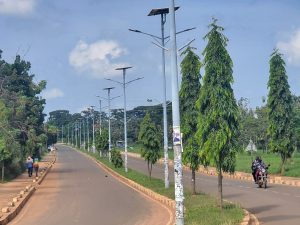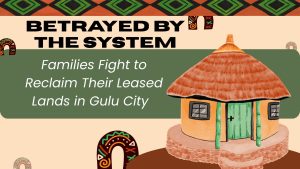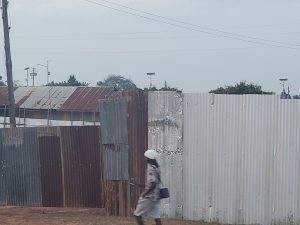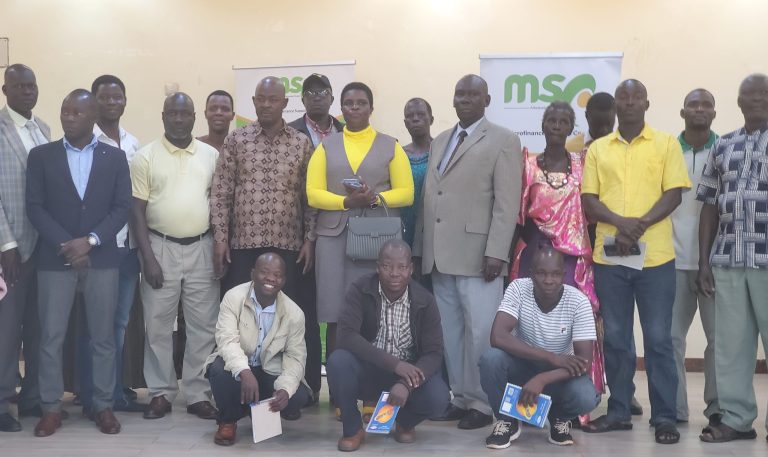Two families in Gulu City are locked in painful battles to reclaim their land after what they describe as betrayal by city authorities and a broken land management system.
By Chowoo Willy
Gulu: When Julius Okeny walked into the Gulu District Land Office in early 2021, his goal was simple: to renew a lease on his late father’s property along Eden Road in Gulu city. The land, on plot 7 measuring 0.299 hectares, was leased to his father, the late Justine Okeny commonly known as Okeny Vitaform, in 1978 for 43 years.
The running offer by the then Gulu district Land board was due to expire on 10th April, 2021. Okeny, as the administrator of the estate, began the renewal process before even the lease expired, as mandated by law. But then came the shock: he was told there was a temporary government suspension on issuing new titles and renewals in all the 10 new cities.
This development coincided with a directive from the Ministry of Local Government to town clerks and chief administrative officers in the ten newly created cities and their parent districts, instructing them not to tamper with immovable assets such as land and buildings. The circular further directed the authorities not to sell, renew, or issue titles on institutional land pending further guidance from the ministry.
“They told me the Ministry of Local Government had halted renewals because of the transition from district to city,” Okeny recalled. “But as we waited, the same land was given to someone else.”
According to Okeny, when Gulu City’s inaugural Land Board started work in 2023, they continued with the process without any problem, not until 2024 when they received a shock to their lives. To his disbelief, the title was reallocated to the management of Bomah Hotel Limited, a powerful business group in Gulu city and owned by a powerful government minister Eng. Hillary Onek. The Okeny family says this happened while their renewal application was still pending.
“People here have developed the habit of using money to influence decisions,” Okeny said. “I started the process very well, and it had reached the stage of consideration, but then everything suddenly stopped.”
He revealed that about a year later, the owner of Bomah Hotel expressed interest in the same land and allegedly influenced officials to frustrate his family’s application. “The issue came in at the tail end of the process,” he added.
The plot in dispute is directly opposite the southern gate of Bomah Hotel, in Gulu City.
Judiciary Review Setback.
When the Okeny’s family realised that the city council land board voted to give out their land to Bomah Hotel, they applied for judicial review at Gulu High Court
“We had applied for judicial review because we suspected foul play, but this didn’t help,” Okeny said.
Okeny accuses the city officials and the Ministry of Lands of collusion. His family has since filed a lawsuit against the Gulu City Council, Bomah Hotel Limited, and the Ministry of Lands.
According to Okeny, they applied for Caveat with the Ministry of Land Zonal Offices in Gulu city, which was granted to them, but to their surprise, the same person who issued and signed the caveat was the one who signed the controversial title.
“The registrar at the Gulu Zonal Office, the same person who placed a caveat on our land, went ahead and issued a new title to Bomah. That is fraud.” He notes.
The Ministry of Lands, meanwhile, maintained that it acted on the recommendation of the Gulu City Land Board, which approved the reallocations of the lease to management of Bomah Hotel. According to the ministry, the city authorities accused Okeny of failing to develop the land for 49 years and therefore decided not to renew his lease.
The Ministry’s spokesperson Denis Obbo said the city land board voted four to one in favour of reallocating the land to Bomah Hotel.
“The said caveat was issued under Section 20 of the RTA, which automatically lapses after 30 days. The Ministry of Lands is aware, and the office of the Commissioner put in a defence together with the board,” Obbo stated.
However, Okeny said his family had fulfilled all the requirements of the lease and denied ever receiving any formal notification from the city authorities indicating that their lease would not be renewed due to alleged failure to develop the land.
“We did not get any notification. What we know, we fulfilled all the conditions to have our lease renewed”, he notes.
Under Uganda’s Land Act, Cap 227, and the accompanying Land Regulations (2004), the law provides that a leasehold tenant must be notified in advance before the expiry of their lease. Specifically, Regulation 37(1) of the Land Regulations states that the controlling authority, whether a District or City Land Board, shall, at least six months before the expiry of a lease, notify the lessee in writing of the impending expiration and invite them to apply for renewal if they so wish.
This provision ensures that sitting tenants, who have complied with the terms and conditions of their lease, are given the first right of renewal before the land can be reallocated to any other person. Failure by the authority to issue such a notification constitutes an administrative omission and may amount to a violation of the lessee’s property rights as protected under Article 26 of the Constitution of Uganda.
The Okeny case illustrates a growing problem, where sitting tenants lose land not because they failed to meet requirements, but because the system favours those with power and connections.
The Okeny family has now filed a lawsuit against Bomah Hotel Ltd, Gulu City Council, and the Ministry of Lands, accusing them of fraud and abuse of office.
The case is expected to test the transparency and integrity of land administration in Gulu City, where dozens of families are facing similar challenges with lease renewals.
Obbo, the spokesperson of ministry of Lands , notes that the office of the title is aware of the pending legal battle, “There is far and wide pre-jurisprudence on this matter, but the office of the title is aware and handling.”
The Gulu City Council is currently facing 22 land-related cases before the Gulu High Court. Some of the new cases include alleged illegal acquistation of land title on customary land belonging to Orach in Kasubi ward and the case of illegal demolitation of lockup shops for the developers (Lockup shop owners) in the same area. However, the city’s Town Clerk Ahimbisimbwe Innocent said that the public should not to be alarmed by the number of lawsuits against the council, but rather to focus on how many of those cases the city actually loses.
“Court is a place to register a complaint, that is natural, someone’s right to go to court”, he notes.
In a typical situation where the decisions of the land board lead to numerous court battles, the contracts of land board members are usually not renewed. However, in the case of Gulu city, the City Executive Committee, headed by the city mayor as the appointing authority, has recently rewarded all the members with another three-year mega contracts.
Systematic inefficiencies.
There is a growing systematic pattern of negligence across the land boards in the local governments, where leaseholders just lose their land without notifications from the authority.
Across city, Oroma Gladys had faced a similar nightmare. Her late mother, Aketo Vento Ngeca, bought land along Lancashire Avenue in the former Pece Division in 1994 and received a 10-year lease from the then Gulu District Land Board.
The family lived peacefully on the land for nearly two decades, until one day, a man named Okumu Charles appeared with a truck full of building materials, claiming the land was his.
“He just came with sand, stones, and cement and said he had come to build,” Gladys recalled. “We were shocked. We had been living there since 2000. How could it suddenly belong to someone else?”
The confrontation led to a long legal battle. Okumu presented documents including lease, a receipt claiming he had bought the land a day before their mother did.
“We went to court and lost the first case in the magistrate’s court,” Gladys said. “But we appealed to the High Court, and we won. The court confirmed the land was ours.”
Yet, even after victory, their troubles didn’t end. When the family returned to renew their lease, they discovered it had long expired, and no one from the council had ever notified them.
“We started the renewal process, but the file kept being transferred between the district and the city council. It’s been two years of chasing the same file,” Gladys said. “Every time you go, they tell you to wait because your file is ‘in the next bunch’ being transferred.”
She worries that while her family waits, someone else might be quietly given their land.
“The fear is real. They can just say your lease expired, so we gave it away. It’s happened to others. We are only safe if we get that title renewed.”
Both the Okeny and Oroma families are victims of the same administrative negligence, a failure by the Gulu City Land Board and the former Gulu district Land to notify leaseholders when their leases expire. The law grants sitting tenants the first right of renewal, but without timely notice, many find themselves suddenly dispossessed.
For the case of Oroma. The title was not issued on institutional land, it was the land bought by the family, after the expiration of the lease, the land has reverted to customary land according to the 1995 constitution, and now she is struggling to convert it to freehold.
In Okeny’s case, a valuable commercial plot was reallocated to a politically connected investor. Oroma’s years of court battles and delays have kept a family in limbo, unable to develop or even use their land confidently.
Oroma said there is also a lingering fear that once they begin using the land, someone else might suddenly show up and claim ownership, saying, “comes and claims it’s their land, and then that money they will have invested and all that will have gone to waste.”
Behind both stories lies a bigger question: How many other families in Gulu are losing their land simply because officials fail, or refuse, to follow the law? Their stories, of Okeny Justine and Oroma Gladys, reveal a web of corruption, neglect, and administrative failure that continues to rob ordinary citizens of their right to land.
City Land Board Under Scrutiny
Sources within the Gulu City Land Board confirmed that hundreds of leases are currently pending renewal due to what they described as “transition delays” following Gulu’s elevation to city status in 2020. However, several landowners accuse board members of prioritising politically connected individuals and business elites over existing tenants.
In the case of Okeny’s lease renewal, members of the Gulu City Land Board were sharply divided. The Board Chairperson, Owor Arthur, opposed the decision to reallocate the land to Bomah Hotel Limited, arguing that Okeny was the first to express interest and therefore deserved priority as the sitting tenant.
The Board had earlier advised the City Council to seek guidance from the Attorney General before taking any action. However, when the matter was put to a vote, three members voted in favour of Bomah Hotel, while only the chairperson voted against the allocation. One member could have been absent during the vote or refused to vote since the land comprises of five members.
Even after the vote, the Chairman of the Gulu City Land Board, Owor Arthur, maintained his dissent. On April 23, 2024, in a leaked l protest letter to the Secretary of the City Land Board, he wrote reiterating his position that the Council should first seek the guidance of the Attorney General before reallocating the land.
“My only opinion, being the minority, was and is still that the opinion of the Attorney General will provide the necessary safeguard for the City Council, since the City in the recent past is confronted with a plethora of court cases,” Owor wrote.
In the same letter, Owor emphasized that consulting the Attorney General would not undermine the Board’s authority to decide on the matter but would rather ensure legal protection and fairness. He also admitted that the City had failed to notify the leaseholder about the lease’s expiry, as required by law.
“One of the tricky issues is that the City has the responsibility to communicate to the lessee in the event they have fallen short of the provisions of the lease before the land in question is reallocated, which, in my view, has not been done in any of the cases,” he noted.
Owor’s letter underscores the growing concern within the Land Board itself about procedural lapses and possible violations of land laws in the administration of leases in Gulu City.
A legal expert, Tony Kitara, says the city’s handling of lease renewals borders on illegality.
“The law is clear, sitting tenants have the first right of renewal if they meet the conditions,” Kitara explained. “Failure to notify them and reallocating the same land to others without due process is a violation of property rights. The city could face serious legal consequences.”
Voice-1: Counsel Kitara expresses his view on the matter
Earlier this year (2025), the Gulu High Court compelled the City Land Board to controversially renew a lease on Plot 31, Gulu Avenue, a piece of land where an investor had proposed to set up a petrol station in a wetland. The decision sparked widespread debate and protest among residents, who had expected the city authorities not to extend the lease.
However, Evelyn Mukonyezi, the Principal Land Management Officer at Gulu City Council, said the city will no longer renew titles issued on wetlands once they expire. This does not align with the President’s directive ordering the cancellation of all land titles issued in wetlands across the country but not wait for expiration.
The question is, what could have happened on the wetlands as they wait for it to expire after 15,49 or 99 years? In Uganda, issuing land titles in wetlands is illegal under several key legal instruments. The prohibition is not found in a single sentence of law but is derived from a combination of constitutional, environmental, and land management provisions.

Burden of converting Statutory Leases.
The individuals and institutions that are holding statutory leases that were created before the 1995 consitutio are struggling to covert them into freehold titles.
But Gulu City lawyer Tony Kitara said that such leases ceased to exist under the current land laws
Kitara explained that the 1995 Constitution and the Land Act abolished statutory leases that existed in former municipal and town council areas, returning ownership to the original customary landowners.
“If you are holding a lease in the city or municipalities, like Anaka or Koch Goma, and it was created before the 1995 Constitution, go and convert it,” Kitara said. “Those were statutory leases which were abolished. If they were not converted before expiry, that land is no longer leasehold.”
He emphasised that many urban authorities continue to claim ownership of land that reverted to customary ownership, yet they lack valid certificates of title. He said the law is clear that land ownership in Uganda must be supported by a certificate of title.
“If the city is claiming that that is their land, let them prove title. You can’t give what you don’t own,” he added, referring to the principle of law that prohibits transferring property without ownership rights.
According to Kitara, once a statutory lease expires without conversion, the land automatically reverts to the original customary owners. He noted that Gulu City and its divisions cannot legally extend such leases or allocate the same land to new applicants.
“The land now reverts to the customary owner. Gulu City cannot take it. They are wasting their time. If the city insists, the affected people can win in court and get compensated,” he stated.
Kitara criticized instances where city authorities have reallocated land formerly held under abolished leases, citing the example of a controversial allocation to Bomah hotel. He argued that such allocations are null and void since the city lacks ownership.
“They went ahead and gave it to Bomah. You can’t give what you don’t have. If they really needed it, they should have negotiated and bought it from Okeny,” Kitara advised.
Under the 1995 Constitution, land ownership in Uganda was restructured, recognizing customary, freehold, leasehold, and mailo tenures, while abolishing statutory leases that had been common in urban areas. The law provides for leaseholders to convert their running leases into freehold before expiry.
Kitara’s advice comes amid growing land disputes in Gulu City involving expired leases and contested ownership between customary landowners and local authorities.
Voice-2: Counsel Kitara explains more about the expired leases
Residents in Gulu City who have attempted to convert their pre-1995 statutory leases to freehold say they have faced numerous challenges, including corruption and unrealistic conditions set by the city authorities. Several applicants allege that officials in the land department demand bribes to facilitate the conversion process.
For instance, in 2024, a resident identified as Patrick claimed he was asked to pay a bribe of Shs 20 million to convert his plot of land in Laroo-Pece City Division. He reportedly ended up paying more than Shs 15 million in bribes before the process was completed.
Records show that over the past three years, the Gulu city Land Board has handled only 232 freehold applications compared to 3,033 leasehold applications, reflecting the difficulties many applicants face in securing freehold titles.
In the broader Acholi Sub-region, leasehold titles are typically issued only on statutory or freehold land, further complicating access to land ownership under the new tenure system.


